- Last Chance to Register for the ACP Internal Medicine 2015 Meeting
- Spanish Language Interpretation of Select Courses at IM 2015
- New ACP Chapter in India
- Update Your Knowledge with MKSAP 16 Q & A
- MKSAP 17 Now Available for Pre-Order
- ACP Global Perspectives: Looking Back at ACP Internationally
- ACP Leaders on the Road: Peru
- Future Worldwide Internal Medicine Meetings
- ACP Welcomes New International Fellows
- Highlights from ACP Internist and ACP Hospitalist
- Email Page to a Colleague
Last Chance to Register for the ACP Internal Medicine 2015 Meeting

Register for Internal Medicine 2015 before it's too late. Join ACP and thousands of your colleagues in Boston, Massachusetts, from April 30 - May 2, 2015 and transform the way you practice medicine. Internal Medicine 2015 will allow you multiple opportunities to refresh your internal medicine knowledge, sharpen your practice management skills, network with colleagues from around the world in a beautiful location.
For the 100th anniversary, ACP is offering special registration rates for many international attendees. ACP members in low income/low middle income countries and upper middle income countries, as defined by the World Bank Economic Indicators, will be offered these special discount registration rates for ACP Internal Medicine 2015 in Boston.
Spanish Language Interpretation of Select Courses at IM 2015
This year, for the first time, ACP will be offering simultaneous interpretation of select scientific courses for attendees who would prefer to hear lectures in Spanish. Headsets will be available for pickup onsite for those who are interested. The courses that will be interpreted into Spanish include:
Friday, May 1, 2015
- Update in Hospital Medicine - 8:15-9:15 AM
- Update in Critical Care - 9:30-10:30 AM
- Update in Women's Health - 11:15-12:45 PM
- Update in Cardiology - 2:15 - 3:45 PM
Saturday, May 2, 2015
- Update in Geriatric Medicine - 8:15-9:15 AM
- Update in Nephrology - 9:30-10:30 AM
- Update in Infectious Diseases - 11:15-12:45 PM
- Update in Pulmonary Medicine - 2:15-3:45 PM
All courses will be conveniently located in Ballroom East of the Convention Center.
New ACP Chapter in India
ACP is pleased to announce the establishment of the ACP India Chapter effective January 1, 2015.
Since July 2012, ACP has been working with the MCI Group to expand our activities in India and increase awareness of the College among Indian physicians. With the help of MCI, 30 free lectures have been offered at various institutions, primarily in Mumbai and Delhi, led by members of the Board of Regents.
ACP offered its first conference in India September 5-6, 2014, in New Delhi, with the theme: "The Burden of Non-communicable Diseases." The highly rated conference offered update sessions that included both an Indian and US speaker. Five of the 23 presentations are available online in the International section of ACP's website.
 The Board of Regents approved the chapter at its meeting on November 15-16, 2014. S.B. Gupta, MD, FACP, (pictured left) was recently approved as Interim Governor based on a recommendation from a 10-member Steering Committee of Indian FACPs. Dr. Gupta is consultant Physician - Cardiologist at Asian Heart Institute, Mumbai and he served as Co-chair, Scientific Program Committee for the ACP India National Conference. He is a past President of the Association of Physicians of India (API). He will provide leadership for the new chapter and will serve as the point of contact between College staff and ACP members in India.
The Board of Regents approved the chapter at its meeting on November 15-16, 2014. S.B. Gupta, MD, FACP, (pictured left) was recently approved as Interim Governor based on a recommendation from a 10-member Steering Committee of Indian FACPs. Dr. Gupta is consultant Physician - Cardiologist at Asian Heart Institute, Mumbai and he served as Co-chair, Scientific Program Committee for the ACP India National Conference. He is a past President of the Association of Physicians of India (API). He will provide leadership for the new chapter and will serve as the point of contact between College staff and ACP members in India.
India is the 16th International Chapter for ACP. Elsewhere, there are 6 chapters in Canada, 6 in Latin America, and 1 each in Japan, Saudi Arabia and Southeast Asia (which includes Thailand, Indonesia, Malaysia, the Philippines and Singapore). Additional countries are approaching the minimum threshold of members needed to establish a chapter. Currently, there are approximately 12,000 ACP members outside the United States.
Update Your Knowledge with MKSAP 16 Q & A
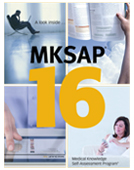
The new Medical Knowledge Self-Assessment Program® (MKSAP® 16) provides you with the most current and critical information in the core of internal medicine and its subspecialties so you can stay aware of what you need to know as a practicing physician in internal medicine today.
For more information on MKSAP 16, or to order your copy, visit http://www.acponline.org/products_services/mksap/16/
MKSAP 16 Q & A
A 32-year-old man is evaluated for a 3-day history of productive cough, sore throat, coryza, rhinorrhea, nasal congestion, generalized myalgia, and fatigue. His sputum is slightly yellow. His two children (ages 3 years and 1 year) had similar symptoms 1 week ago. He is a nonsmoker and has no history of asthma.
On physical examination, temperature is 37.5 °C (99.4 °F), blood pressure is 128/76 mm Hg, pulse rate is 92/min, and respiration rate is 14/min. There is bilateral conjunctival injection. The nasal mucosa is boggy, with clear drainage. The oropharynx is erythematous without tonsillar enlargement or exudates. The tympanic membranes and external auditory canals are normal. Lungs are clear to auscultation. There is no rash or lymphadenopathy.
Which of the following is the most appropriate treatment?
A. Albuterol
B. Amoxicillin
C. Chlorpheniramine
D. Codeine
Click here for the answer and critique.
MKSAP 17 Now Available for Pre-Order
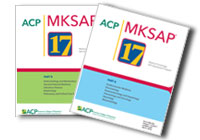 The newest edition of Medical Knowledge Self-Assessment Program® (MKSAP 17) is coming July 31, 2015. And for the first time ever, MKSAP Digital will launch 1 month after the print version.
The newest edition of Medical Knowledge Self-Assessment Program® (MKSAP 17) is coming July 31, 2015. And for the first time ever, MKSAP Digital will launch 1 month after the print version.
- Part A Print: July 31, 2015
- Part A Digital: August 31, 2015
- Part B Print: December 31, 2015
- Part B Digital: January 31, 2016
Setting the definitive standard for self-assessment since 1967, MKSAP continues to honor its legacy by helping internists gain knowledge in the core of internal medicine and its subspecialties. Every 3 years, our program is updated and presented as an original body of scholarly work. The newest edition, MKSAP 17, will give you unparalleled content in a state of-the-art format. Learn from evidence-based clinical scenarios and answering 1,200 entirely new questions
Take advantage of special discounted pricing on MKSAP 17 by placing your pre-order today. For more information, click here or visit www.acponline.org/products_services/mksap/17/index.html.
Internal Medicine: Global Perspectives
ACP's International History: an interview featuring
Virginia L. Hood, MBBS, MPH, FRACP, MACP and Jose A. Rodriguez-Portales, MD, MACP
In this special edition of ACP Global Perspectives, we meet the physician authors of "The American College of Physicians as an International Organization," a chapter from ACP's 100th anniversary book, to be published later this year, entitled: Serving our Patients and Profession: A Centennial History of the American College of Physicians (1915-2015).
Dr. Virginia Hood's and Dr. Jose Rodriguez-Portales's literary contributions to ACP's international history required extensive research and collaboration. Here, in Part I of this interview, they share some of the discoveries and insights gained from that experience. The second half of the interview will appear in the May issue of ACP International.
Dr. Virginia Hood is an internist and nephrologist from Burlington, Vermont. She is a Professor of Medicine at University of Vermont College of Medicine and an attending physician at University of Vermont Medical Center (UVMC). She is certified in internal medicine and nephrology. Dr. Hood is a past President of ACP, a former ACP Regent, and Governor of the ACP Vermont Chapter.
Dr. Jose Rodriguez-Portales has had a distinguished career in internal medicine as a teacher, scholar, and highly respected endocrinologist. He has contributed greatly to organizations promoting excellence and professionalism in internal medicine in Chile. Dr. Rodriguez-Portales is a former ACP Regent and Governor of the ACP Chile Chapter.
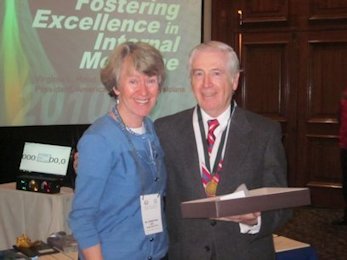 Dr. Hood, left, and Dr. Rodriguez-Portales
Dr. Hood, left, and Dr. Rodriguez-Portales
What were some of the more interesting aspects of ACP's international history that you discovered in researching this project?
Dr. Rodriguez-Portales: It was interesting to learn how the ACP leadership's vision evolved gradually over the years from an "old boys' club" -as Dr. Jock Murray put it - to a worldwide association of internists. The first step was the admission of Canadians as Members and Fellows. At that time, the leaders only wanted English-speaking members, however subsequent expansion within the United States facilitated the request from Governors of southern states such as Florida and Texas to invite physicians from Cuba and Mexico to join in. The big change came in the late 1940's when the ACP agreed to manage an international program that brought to the United States close to 200 Latin American physicians who then returned to positions of leadership in their countries, many as Affiliate Members of the ACP. They constituted the seeds upon which new chapters were formed in the area in future years.
Dr. Hood: Physicians from several countries in the Americas other than the US and Canada were involved in College activities from as early as 1927 but for the next 70 years, growth in this group was episodic. However over the past 20 years, physicians from countries all over the world have expressed interest and international membership has escalated.
International Chapter formation arose not from central outreach but in most cases from a grass roots approach by members in countries who saw that ACP could fill a niche not addressed by existing medical organizations. This process has led to complementary not competitive arrangements with national organizations and has served to promote valuable collaborations.
What did you learn about ACP's international history that surprised you the most?
Dr. Rodriguez-Portales: A surprising aspect of ACP's international history is that expansion beyond the US borders was based more on personal relationships than on official proposals. After the end of World War II there was a flow of young Latin American physicians seeking training in the United States. Many of the preceptors of these physicians later on became leaders of the ACP. In the early sixties, the Board of Regents formed an International Medical Activities Committee chaired by Dr. Marvin Pollard, a distinguished gastroenterologist from Ann Arbor who had trained several Latin American fellows who had returned to their countries. The ACP's Executive Secretary Dr. Edward Rosenow, Dr. Pollard and their wives embarked on a semi-touristic /semi-scientific tour of Latin American cities where they had friends or former trainees and gave lectures there together with select local physicians. These lectures evolved into successful postgraduate courses that attracted physicians to eventually form Regions and then Chapters of the ACP.
Dr. Hood: In the first decade, Canadian physicians were fully engaged in the College and influential in governance. By 1927 there were 6 governors from Canada and by 1935 there had been several members of the BOR, a vice president and two presidents who practiced in Canada.
After clear involvement of physicians from other countries very early in the history of the College, in the 1920s, 1940s and on several occasions more recently there was serious debate about whether or not the College should encourage international membership. However, in all eras, there have always been one or more members, often in leadership positions, who recognized the importance of a multidirectional exchange of information and mutual benefit to all members of engagement with international colleagues and their influence prevailed.
ACP was an early leader in recognizing the potential for conflict of interests when receiving targeted funds from the pharmaceutical industry. In 1956 policy was established to not use such funds to bring international visitors to Annual Session and subsequently not to accept them for any named lectureships in the College.
What, if anything, did you find to be disappointing about ACP's international history?
Dr. Rodriguez-Portales: The struggle between isolationism and interventionism has been present in different periods during the history of the United States, particularly in the years after World War I when the ACP was in its beginnings. At this time, many of the ACP leaders did not want foreigners in the College. However, as membership grew and foreign physicians became better known after training, this attitude changed and during the second half of the 20th century the ACP has implemented a clear policy of international growth.
Dr. Hood: In terms of writing the chapter, it was hard to find good documentation of the thinking behind some pivotal decisions that affected international activities.
It was disappointing to learn that after the early involvement of physicians from Canada and Central America, it was not until 1948 that the College broadened its scope of international activities. Even after that, there were periods when international membership was not encouraged, initially because of concerns about the value of the College to physicians from non-English speaking countries and difficulty with credentialing and later, concern about resources.
How do you think the College is viewed by most international physicians?
Dr. Rodriguez-Portales: Recent surveys show that international physicians are more satisfied with their membership in the ACP than their US counterparts. I think that this is due, at least in part, to the fact that for foreign physicians the ACP represents their personal link to American medicine. Members in other countries value the ACP for its learning resources, especially Annals of Internal Medicine and MKSAP. For many, adding FACP to their names is a matter of professional pride and recognition by peers.
Dr. Hood: International physicians who are members and many who are not view the College very positively. We know this from surveys and comments. In the past 5 years, surveys have shown that 97% of international members feel favorable about membership which is greater than for US members.
International members tell us that ACP provides highly valued professional recognition at an international level, high quality educational programs products and services, an opportunity to belong to a prestigious organization and to engage with physicians in the US and other countries.
Stay tuned for part two of this interview in the May edition of ACP International!
ACP Leaders on the Road: Peru
Maximo Brito, MD, FACP
Peruvian Congress of Internal Medicine
October 28 - November 1, 2014
It was an honor to represent the ACP at the XVIII Peruvian Congress of Internal Medicine in the beautiful city of Lima. The Peruvian Society of Internal Medicine, a prestigious and storied institution in Peru for the past half-century, organized the event. It was the Society's 50th anniversary, their "golden wedding" anniversary, an important milestone that was highlighted in Congress banners and on the scientific program brochure. The meeting started with an opening ceremony where prominent members of the Society reviewed the history of the institution and the status of the internist in Peruvian society. Dr. Fernando Carballo Ordoñez, President of the Peruvian Society of Internal Medicine, officially opened the Congress. The evening concluded with a performance showcasing traditional dances from the various regions of Peru. The scientific program of the meeting was quite diverse and touched every important topic of internal medicine. It was organized in a series of symposia with interspersed keynote lectures featuring prominent Peruvian and international speakers.
It would be a travesty to go to Peru and not visit the gems of the Inca culture, thus, I travelled to the city of Cusco nestled in the Andes mountain range at an elevation of 3,400 meters. Cusco is recognized as the capital of the Inca Empire, an impressive civilization that populated an area spanning six present day South American countries. This wonderful city is a World Heritage Site filled with historic jewels, beautiful cathedrals, churches and Inca ruins. From Cusco, I travelled by train to the Inca citadel of Machu Picchu. This most recognizable world wonder stands as a testament to the ingenuity and prowess of an extraordinary ancient civilization.
Our Peruvian colleagues are working hard to recruit the required number of internists to create their own ACP chapter. They are very excited about this possibility, which will surely become a reality in the near future. This was a scientifically sound and well-attended meeting. I was impressed by the organization and richness of the program, was delighted to participate, and remain very thankful for their friendship and warm hospitality.
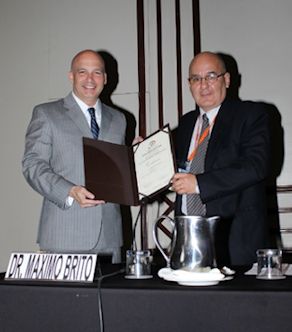
Pictured above: Dr. Brito and Dr. Fernando Carballo Ordoñez
Future Worldwide Internal Medicine Meetings
Upcoming meetings will be held in Australia and Bangladesh.
A complete list of other Future Worldwide Internal Medicine Meetings is available here.
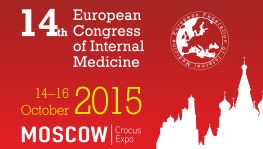 Save the date! The 14th European Congress of Internal Medicine will be held in Moscow, Russia from October 14-16, 2015. ECIM 2015 is a scientific Congress during which new research is being presented and discussed among scientists and practitioners from Europe and the rest of the world.
Save the date! The 14th European Congress of Internal Medicine will be held in Moscow, Russia from October 14-16, 2015. ECIM 2015 is a scientific Congress during which new research is being presented and discussed among scientists and practitioners from Europe and the rest of the world.
New International Fellows
ACP is pleased to announce the following newly elected International Fellows, who were recommended by the Credentials Committee and approved for election by the Board of Regents as of March 1, 2015. They are listed by current location and may have been credentialed through a different Chapter.
Bangladesh
-
Mohammad Abul Hassan Chowdhury, MBBS, FACP - Chittagong
-
Mohammad Zahir Uddin, MD, MBBS, FACP - Dhaka
Brazil
-
Carlos E. Bueno, MD, PhD - Marilia SP
Colombia
-
Yazmin Cecilia X Abuabara, MD, FACP - Cartagena Bolivar
Canada
-
Wee Shian Chan, MD, FACP - Vancouver
- Shavinder S. Gill, MBBS, FACP - Abbotsford
- Pedro Lopez, MD, FACP - Sudbury
- P. Ruth McPherson, MD, FACP - Ottawa
-
Tariq M. Qureshi, MBBS, FACP - Toronto
Chile
-
Claudia P. Cortes Moncada, MD, FACP - Santiago
- Maria Patricia Gomez Morales, MD, FACP - Santiago
- Jose Pardo Gutiierez, MD, FACP - Santiago
-
Pamela Andrea Wurmann, MD, FACP - Santiago
Egypt
-
Hussein A. Sheashaa, MBBCH, FACP - Mansoura
India
-
Suchitra Behl, MBBS, FACP - New Delhi
-
Murugesan Ram Prabahar, MD, MBBS - Chennai
Indonesia
-
Ika Prasetya Wijaya, MD, FACP - Jakarta Timur
Japan
-
Yasuyoshi Takei, MD, FACP - Tokyo
Mexico
-
Eliana Cejudo Carranza, MD, FACP - Mexico DF
Nigeria
-
Ebenezer A. Ajayi, MBBS, FACP - Ekiti
Pakistan
-
Suhail Almani, MD, FACP - Hyderabad Sindh
- Raheel Iftikhar, MBBS, FACP - Islamabad
- Sultan Mehmood Kamran, MD, MBBS - Rawalpindi
Philippines
-
Eduardo S. Caguioa, MD, FACP - Quezon City
-
Francisco P. Tranquilino, MD, FACP - Paranaque City
Saudi Arabia
-
Khalid I AlMatham, MBBS, FACP - Riyadh
United Arab Emirates
-
Hanan I Sheikh-Ibrahim, MD, FACP - Abu Dhabi
Highlights from ACP Internist and
ACP Hospitalist
ACP Internist January/February 2015
- Incontinence can hide in middle age
Women may suffer debilitating quality-of-life issues from urinary incontinence yet never mention it to their primary care physicians. The condition can be successfully managed by nonsurgical and nonpharmacological means, if physicians can tactfully bring up the subject first.
- Hepatitis C drugs offer new options
The approval of multiple drugs in 2013 and 2014 that are able to cure hepatitis C without the use of interferon has dramatically changed the screening, treatment, and epidemiologic paradigms of the virus. Soon, internists will be involved in this rapidly changing area of health care.
- Experts agree on principles of diabetes care
Learn 10 guiding principles for the care of people with or at risk for diabetes.
ACP Hospitalist January/February 2015
- From too little to too much
Experts struggle to find the optimal venous thromboembolism prophylaxis strategy.
- When it could be Ebola...
There are lots of differential diagnoses, too.
- Obesity and malnutrition are not mutually exclusive
Evidence suggests malnutrition counteracts 'obesity paradox'.
MKSAP 16 Answer & Critique
Answer: C, Chlorpheniramine
Educational Objective: Treat acute rhinosinusitis.
Critique: Treatment with chlorpheniramine may be considered for this patient. The common cold, or rhinosinusitis, presents with acute cough, nasal congestion, rhinorrhea, and occasionally, low-grade fever. Targeted treatment is aimed at symptom relief. Antihistamines, such as chlorpheniramine, and antihistamine-decongestant combinations have been shown to decrease congestion and rhinorrhea with variable effects on cough suppression. Second-generation nonsedating antihistamines are generally ineffective for rhinosinusitis symptoms.
Albuterol does not relieve symptoms of rhinosinusitis unless wheezing is present. The patient did not report wheezing or shortness of breath, and wheezes were not heard on examination.
Because rhinosinusitis is caused by viruses, routine antibiotic treatment in immunocompetent hosts is not recommended. Antibiotics do not improve symptoms, illness duration, or patient satisfaction with medical care. Contrary to common belief, purulent sputum does not reliably predict bacterial infection or superinfection. Therefore, sputum purulence should not be used as a criterion for antibiotic administration. Evidence-based guidelines from the Infectious Diseases Society of America suggest that if bacterial rhinosinusitis is highly suspected, based on the presence of persistent symptoms or signs lasting more than 10 days without evidence of clinical improvement, onset with severe symptoms (fever >39.0 °C [102.2 °F]), or onset with worsening symptoms or signs (new fever, headache, or upper respiratory tract infection symptoms that were initially improving), the antibiotic of choice is amoxicillin-clavulanate.
Multiple studies have found little if any improvement in acute cough associated with acute upper respiratory tract infections by using codeine, dextromethorphan, or moguisteine antitussive therapy. The American College of Chest Physicians does not recommend treatment with these medications. Codeine may be effective in patients with chronic cough; however, it is not indicated in this patient with acute rhinosinusitis.
Other treatments that may relieve symptoms of rhinosinusitis include intranasal ipratropium (rhinorrhea and sneezing), intranasal cromolyn (rhinorrhea, cough, throat pain), and short-term topical nasal decongestants (nasal obstruction). Consistent high-quality data on the use of zinc, echinacea, and vitamin C do not support the use of these over-the-counter products for the treatment or prevention of rhinosinusitis.
Key Point: Antibiotics are not recommended for the treatment of acute rhinosinusitis.
Bibliography:
Siamasek M, Blandino DA. Treatment of the common cold. Am Fam Physician. 2007;75(4):515-520. [PMID: 17323712]

